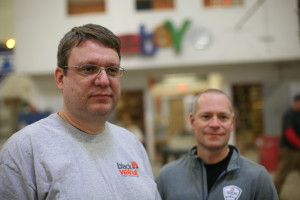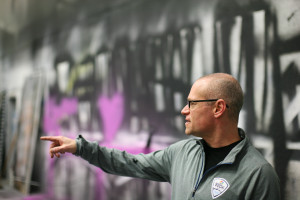Gold medal sets
If a company can be afflicted with jet lag, one might expect to have seen it recently at the blackwalnut L.L.C. plant in Rockland County.
The Sochi Olympics patch with the NBC peacock logo on the warm-up jacket worn by managing partner Jacob Gendelman, a blackwalnut co-founder, suggests great distances traveled in recent months. If in February you watched at all the 2014 Winter Olympics on NBC, you saw the painstaking technical and construction work, in high-definition images, of this 11-year-old Valley Cottage company with an impressive international resume.
“It”™s terrible,” Gendelman said of the Russia he saw during a three-week stay in Sochi in December to oversee installation of the studio sets his company built for NBC Sports. “Sochi was a disaster. The Russians were months behind.” Not allowed to use Russian workers, Gendelman hired a United Kingdom crew for the work. It proved to be a good move, he said.

Gendelman, a graduate of New York University”™s film and theater school, led a recent tour of blackwalnut”™s production facility, where finish and carpentry crews ”“ members of Local 645 of the International Alliance of Theatrical Stage Employees ”“ assembled a new broadcast platform for The Weather Channel. He”™ll travel to Atlanta this month to “hand over the keys” to his company”™s six-week project at Weather Channel headquarters there.
On the production floor, a paint department worker applied a blue-tipped brush to a rounded section of a stage bound for one of Manhattan”™s Off Broadway theaters. Though theater projects such as this one and live events and corporate road shows have helped blackwalnut diversify, 85 percent of its business comes from the television broadcast industry, Gendelman said.
Having survived the recession ”“ barely ”“ after a fast early growth spurt, blackwalnut has become one of the world”™s leading fabricators of television broadcast sets. Its annual revenue has reached $8 million. It has built sets on five continents for clients that include MSNBC, ESPN, Fox News, Comedy Central, China Central Television ”“ in Kenya, London and Washington, D.C. ”“ Al Jazeera America, Telemundo and Alhurra, an Arabic-language television company financed by the U.S. government that hired blackwalnut to build and install studio sets in Dubai and Beirut, Lebanon.

“Your typical broadcast set, an Olympic-size set, would cost upwards of $1 million,” Gendelman said. Broadcast sets can range in cost “from $150,000 to several million dollars on the high end.”
Sochi was the third Olympics venue, and the most distant and most comfort-challenging, for blackwalnut”™s installers and managers. CTV Television Network, Canada”™s top-rated and largest privately owned network, hired the New York company to build its studio sets for both the 2010 Winter Olympics in Vancouver and the 2012 Summer Olympics in London. Blackwalnut also built the set for CTV”™s Toronto bureau.
From its 44,000-square-foot plant in the Clarkstown Executive Park, blackwalnut over eight hectic months last year built and shipped to Russia in modular sections NBC”™s daytime and primetime Olympic sets. Measuring 1,800 square feet and 3,600 square feet and built with aluminum and steel and high-end flooring and wall finishes, they included a wraparound video screen, a Plexiglas icefall as background and thousands of feet of color-changing LED lighting.
Mike Van Dusen, blackwalnut”™s co-founding managing partner and production head, called the million-dollar-plus NBC project “a watershed moment” for the company and the design of the sets, by Clickspring Design in Manhattan, “hands-down the sharpest we”™ve ever worked with.” Facing tight deadlines, a common occupational hazard for set fabricators, blackwalnut employees “went 46 days straight from 7 a.m. to 9 p.m., seven days a week” to complete the Sochi sets, he said.
“We”™re sort of the anecdotal evidence that the economy has incrementally improved” since the Great Recession, Gendelman said. “There were days in the recession when there were five of us here” in a business that employs up to 60 workers on larger projects.
Working together at Atlantic Studios in Newark, N.J., Van Dusen and Gendelman in 2003 left frustrating jobs and abusive employers to venture on their own in the setmaking business.
“We literally started in his parents”™ garage,” Van Dusen recalled. “We started with literally no money. We put things on our credit cards. Neither of us had business acumen, zero. It was like, ”˜How hard can this be?”™”
Though naïve in the ways of business, the new partners saw early success. “Within three months, we were building the NFL Draft” television set, Gendelman recalled. “Within five months, we were building for CNBC” at its headquarters in nearby Englewood Cliffs. “That was our first huge project. That was about $1 million.”
“The HD conversion” in the television industry “really made the company,” Van Dusen said during a lunch break in his mezzanine office that overlooks the production floor. Among his office mementos are autographed photos of comedians Stephen Colbert and Jon Stewart, whose Comedy Central sets were made right here in Rockland County. “We were totally in the right place at the right time,” he said.
Before HD technology, said Frank Bradley, blackwalnut”™s director of estimating and project management, “We used to do the squint test” to gauge whether material details – a patch of black masking tape on the front of a news anchor desk, for example ”“ would be visible to TV viewers. With HD, “Finish changed a lot,” he said. “Now TV is live.”
“Now it”™s the magnifying glass test,”™ said Gendelman.
“The expectations of designers have changed a lot also,” he said. “Before HD, we were still building sets and they were much more theatrical. For designers now, they”™re built environments. They”™re really not sets anymore.”
With their work in demand, the start-up partners moved the company from Gendelman”™s parents”™ garage to an aged and inadequate former lumber mill in Garnerville. The company relocated to industrial space in the Clarkstown Executive Park in 2005 before moving to this larger facility in the same complex about five years ago.
“We moved in about six minutes before the recession,” Gendelman said wryly. “It turned out to be a poor business decision.”
“From the first year we started until 2009, we grew by double digits every year ”“ by 10 percent to 18 percent,” he said. “Then 2009 hit, and we took a 40 percent drop. All of a sudden, it was like a vast desert before us.”
“We did grow too fast for us,”™ said Bradley, a former manager at Ernst & Young. “You have to manage your growth very well.”
“And our growth basically managed us for the first five years,” Gendelman said. “It”™s been a school of hard knocks kind of education.”
“We sort of dropped off a cliff and crawled our way back,” he said. “These last two years have been terrific.”
Even if Sochi was not.